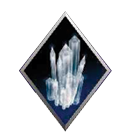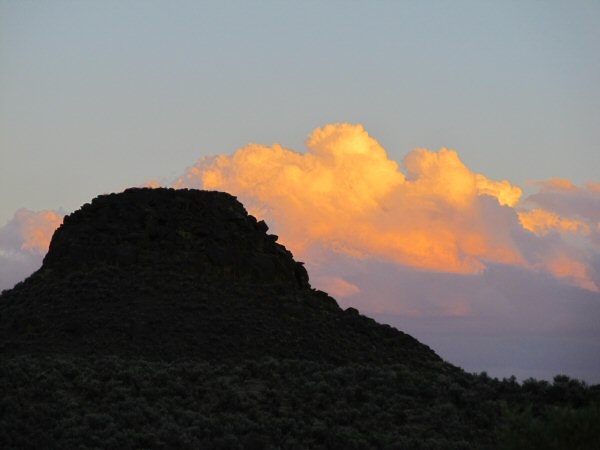
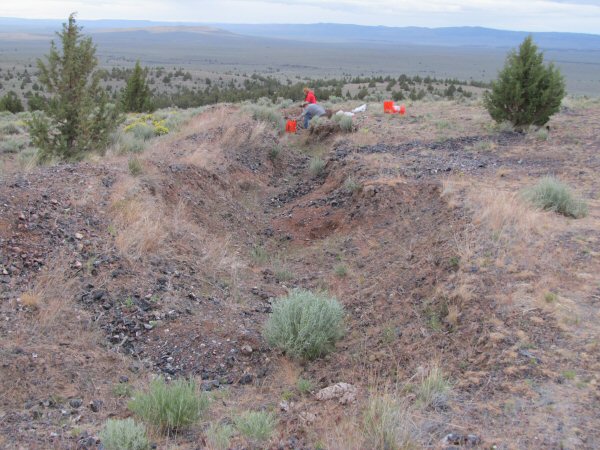
Some friends of mine from the East Kingco Gem & Mineral Club, out of Seattle, Washington, invited me to join them on an Eastern Oregon rockhound ramble. Sounded like a great idea! I met them at Glass Buttes, 77 miles east of Bend, Oregon. The area boasts a variety of different types of obsidian, and has been a favorite locality of rockhounds for decades. We decide to check out the Midnight Lace pits where rockhounds can dig for the prized double flow obsidian, which shows a whimsical pattern of alternating black, and clear flows.
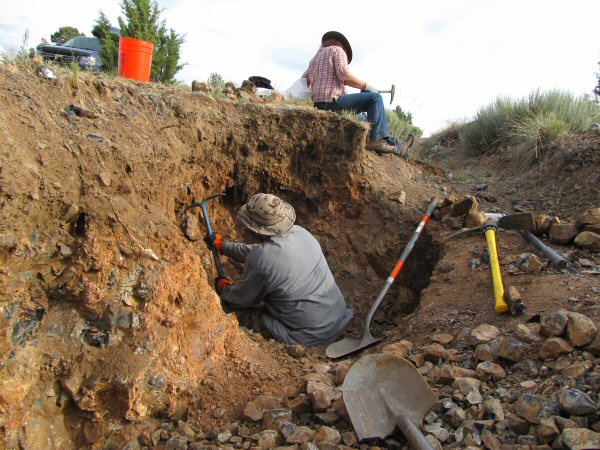
The weather was wet and the only thing better than a good rain coat was a pair of dry shoes and socks! Here, Kevin Rust lays into the wall on one side of a trench, while his wife, Carol, goes through material above. There’s much more obsidian than dirt here, so the practice becomes one of paying attention to picking only the nicest pieces that show good potential to cut with the sought after banding.
I’ll briefly jump forward in time, so I can introduce the rest of our group. Here we all are together in the sunshine that would not materialize for about another week. That’s me on the far left. The back row consists of Ken and Jeanine Metz, excellent rockhounds out of Mukilteo, Washington. In the front row are Carol Rust, Norma McDonald our tireless navigator, and “Captain” Kevin McDonald. Kevin’s holding a scant shard of supposed picture jasper, after we just fanned out and searched a mountain in the heat of the midday sun. Kevin Rust called this the “Picture No Picture Jasper site”. But we won’t talk about getting skunked. (wink)
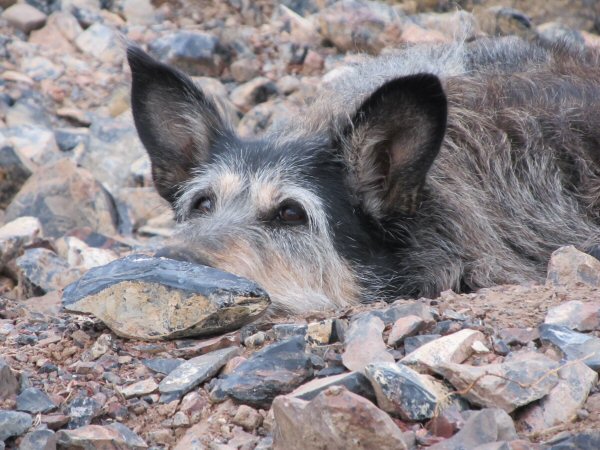
Back at “Rain Buttes” (another Kevin R. moniker), after a good afternoon of prolonged digging, Teensy the dog personifies the rest of the group’s ambitions. She beds down on a pile of obsidian, and won’t be moved.
We head back to “Knappers Camp”, one of a series of wide, accomodating dry camp pullouts, which are close to several nearby obsidian digs.
I see that these Seattle folks are serious! Kevin McDonald has hauled a trim saw out into the field, and he fires it up with Kevin R’s generator. Here, he & Norma advise, while first timer rockhound Tyson Rust slabs off a piece of the freshly dug obsidian.
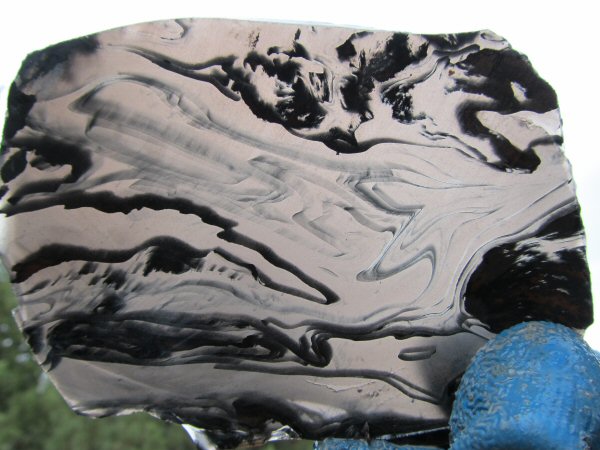
It shows the wonderful, crazy ribbons of Midnight Lace!
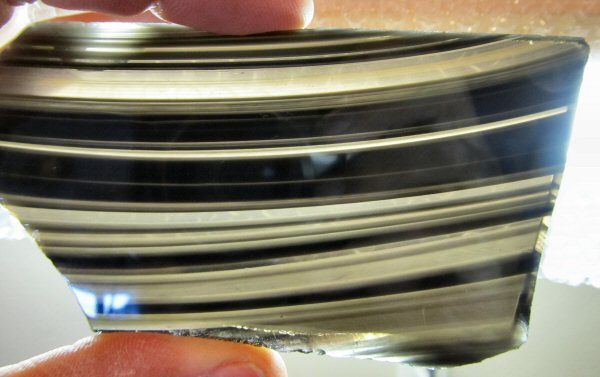
Dramatic bands of double flow obsidian (Midnight Lace) originating from flows that are smooth, and not pulsed like the previous slab.
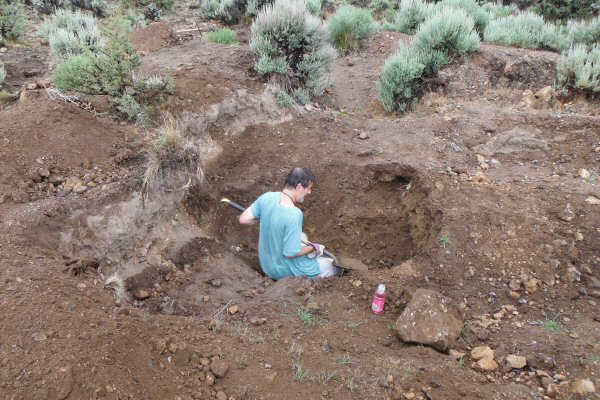
The next morning, I move over to the Aurora Borealis Pit, where I have dug out some nice rainbow obsidian in years past. The pit was in-filled a few years back, and while other shallow pits have taken shape right next to the main one, nobody has gone deep enough to get at the best and largest rainbow obsidian, which is about 6-7 feet deep here. Somebody’s got to do it, so I set about mucking out the pit.
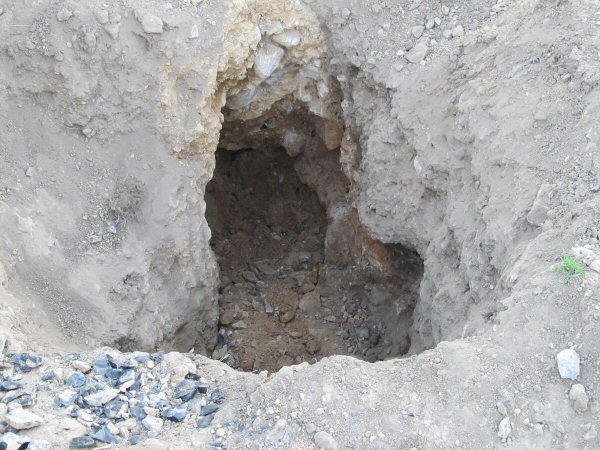
After a few hours of digging, I clear out enough rubble to gain access to fresh digging in the prime lair. A closer look into the maw of the pit shows some niced sized obsidian boulders hanging out on the walls of the deepest part, though a little hard to make out because they are covered in dust. This dig site yields a potpourri of obsidian, including gold sheens, silver sheens, and plain black, but it’s highly likely that there will be some of the sought after rainbow in here.
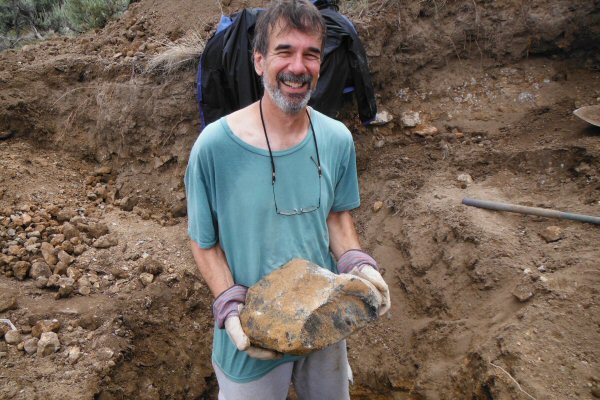
I pop out my first boulder!
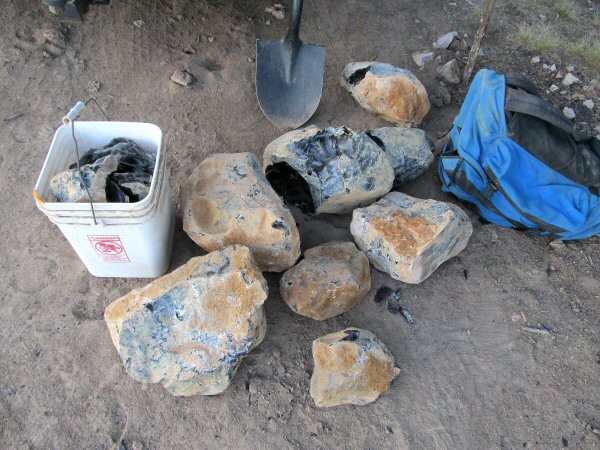
Each time I think I’m just about done, another boulder pokes its nose out of the dirt, and I assemble a very nice collection of rocks, some in the 30-40 pound zone. Most all of these boulders have the subtle tell-tale striping on the surface that indicates that they have varietal flows inside of them.
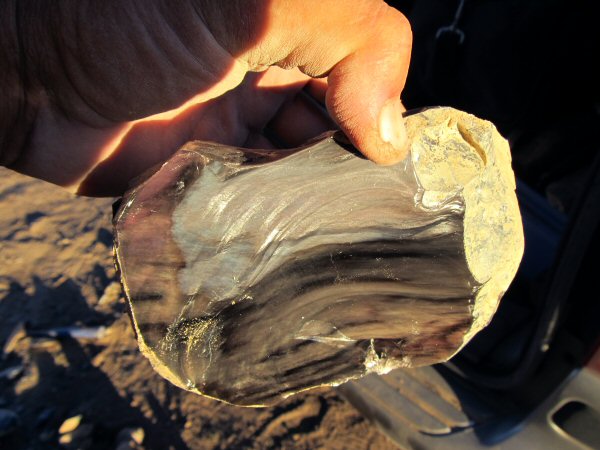
I shear off a chunk from the side of one of the boulders, and sure enough, it is rich with the lovely pastel colors of rainbow obsidian. Most all of this rock is good, and even the small pieces can have surprising color zones. Please note that chipping or cracking obsidian is inherently dangerous. Obsidian breaks with razor sharp edges, and tiny needle sharp fragments can fly up into your face with great velocity. Always wear protective glasses when chipping or breaking obsidian.
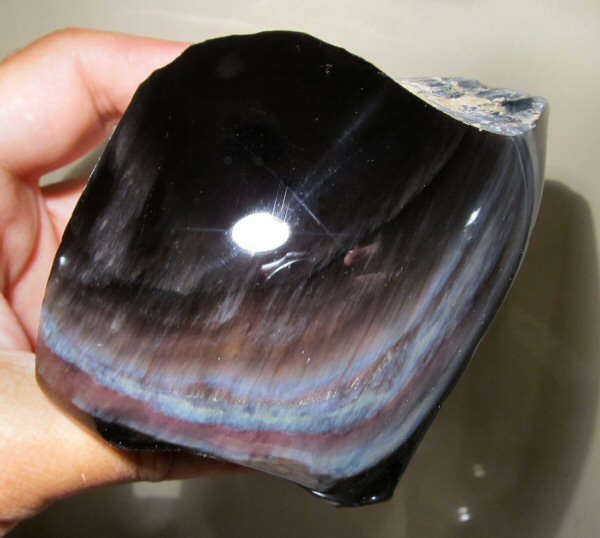
Here’s a hand sized chunk that I polished up, once I got home. Initially, it just showed a dim gold sheen on the surface, but as I ground down on it, and domed it, I was able to work out layers of the pastel blues and pinks.
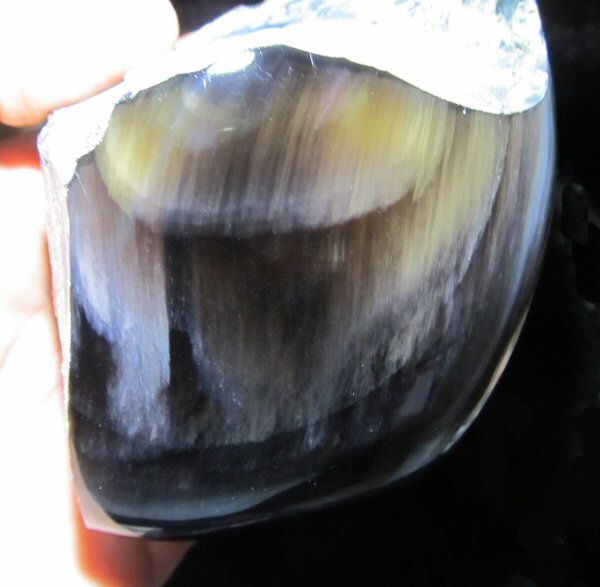
As you roll this piece forward, it develops some startling, and wonderful golden hues. Really quite a nice example!
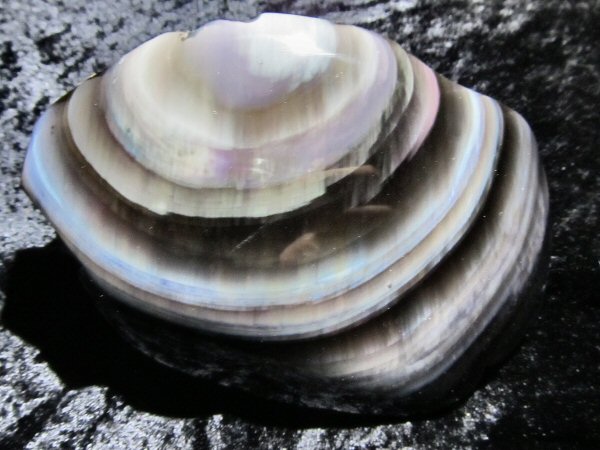
Another Rockin rainbow from the Aurora Borealis Pit, Glass Butte.
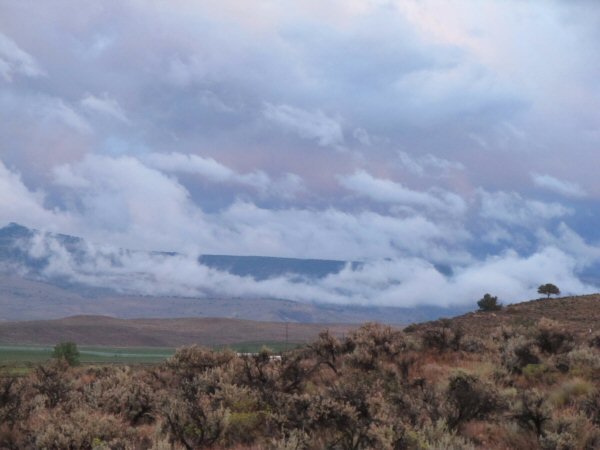
Back out in the field, our group heads out to a well known white plume agate site in the drainage of Stinking Water Creek. The hills in the foreground are scattered with abundant small pieces of agate. The rains show no sign of letting up, but sometimes, wet conditions can tend to help at an agate site.
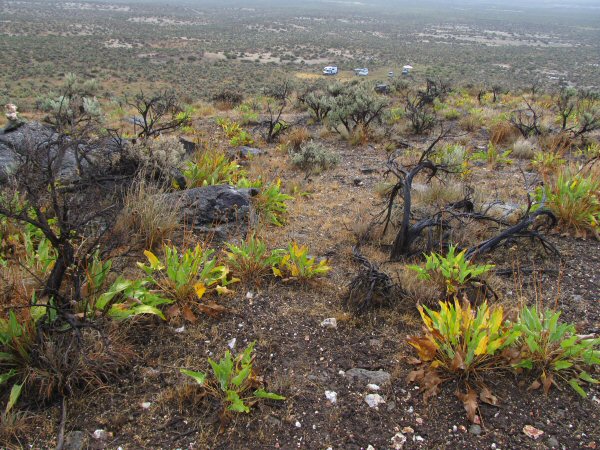
We find a flat camp at the base of the low hills, and I start exploring eagerly, noting that there is actually agate everywhere – on the dirt road leading in, in every drainage channel large or small, and also up on the tops of the hills, as you can see in the picture. A lot of the agate is nondescript, and nothing much larger than 4 inches appears at first, but there is a significant amount that shows white plumes of good, to quite nice quality. After only about 20 minutes out, for some reason, I use my rock pick, to pull at one small piece of agate, among the thousands of small pieces of agate, that have been washed clean by the rain. It doesn’t move, and I realize I’ve got something big.
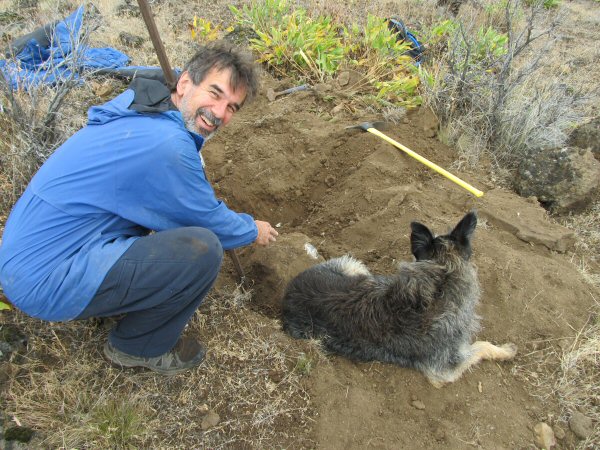
How big is hard to tell, but I’ve pulled back so much dirt that Teensy thinks I’m going after a gopher, and she comes and joins me at my ever enlarging pit. I split off a little corner of the rock, just to check it…
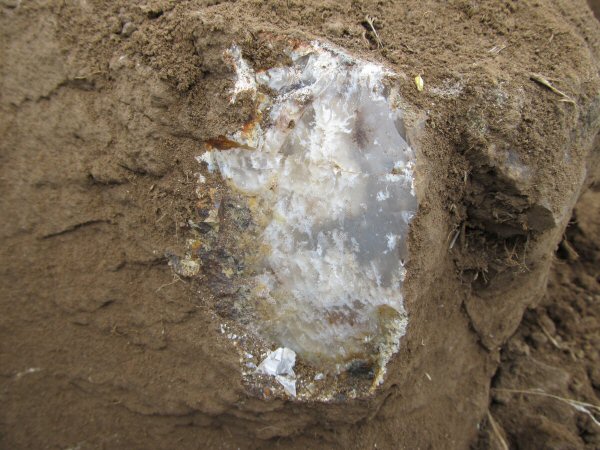
It shows a marvelous white plume!
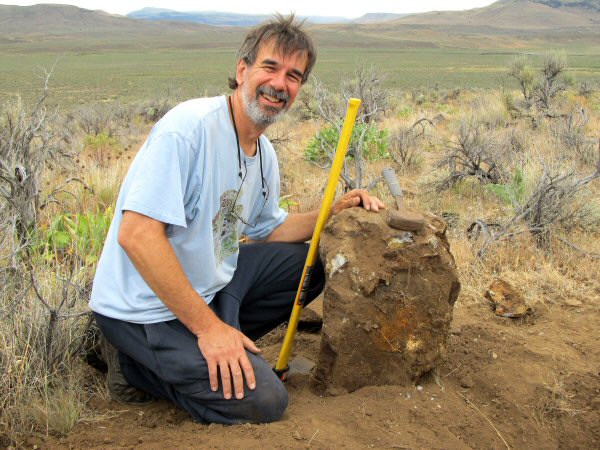
I get the rock out all the way, and it’s pushing 100 pounds – really too big to carry downhill safely, so I use a long handled hammer to break it down into more manageable chunks.
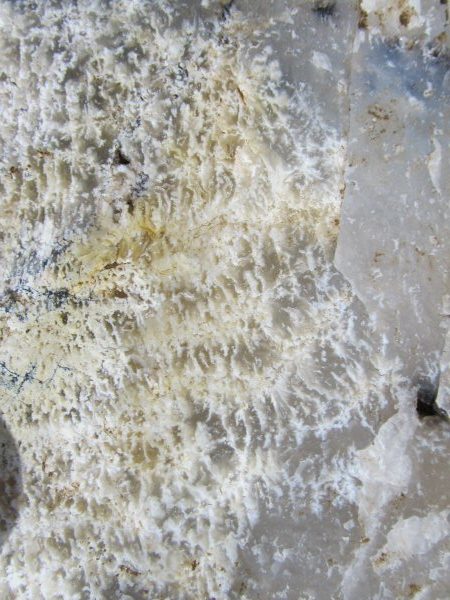
It yields several lesser sized boulders, but still nice sized, and just ripped with beautiful white plume!
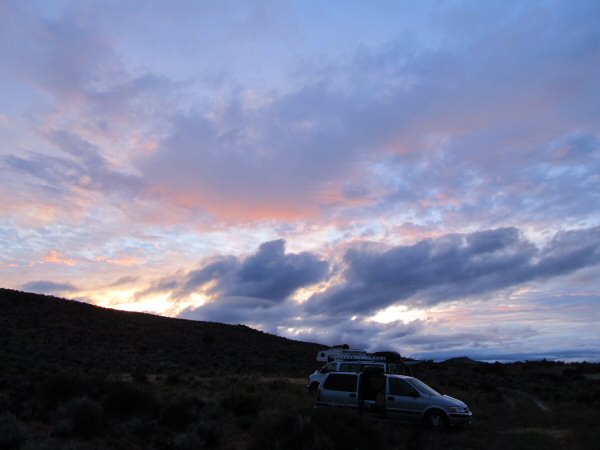
A nice, quiet pastel evening sunset follows the day’s excitement The group is starting to comment that it might need to stop raining soon – nobody’s got any dry clothes left. I don’t know, but I think that when folks from Seattle complain about rain, it’s truly getting bad. The rain does lighten up at times, but it is never far away.
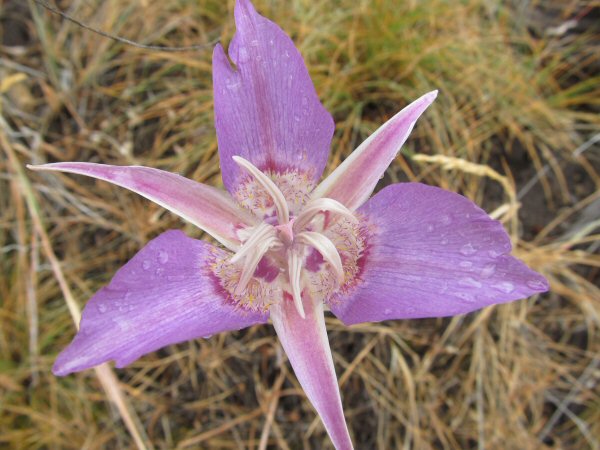
Morning. I wander the hillsides looking for the nice little pieces of botryoidal and angelwing type agate that occur here. Lovely, but sparse little purple flowers are sprinkled here and there. I see one rattle type snake, but can’t positively ID it, as it quickly backs down into a hole in the rock, and I only get a glimpse of it’s wide open pink mouth with needle teeth threatening me as it disappears.
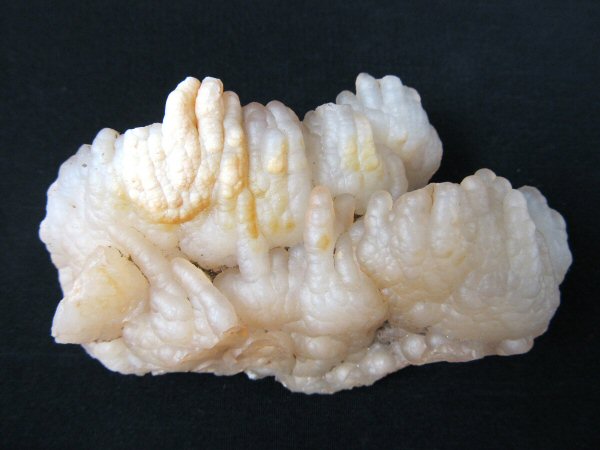
As I mentioned before, every draw, and wash, and steppe between basalt outcrops, seems to hold potential for finding something special. Here’s a lovely little piece of angelwing agate, very reminiscent of the famous McDonald Ranch near Ashwood, Oregon. But it is small – only about 3 inches across.
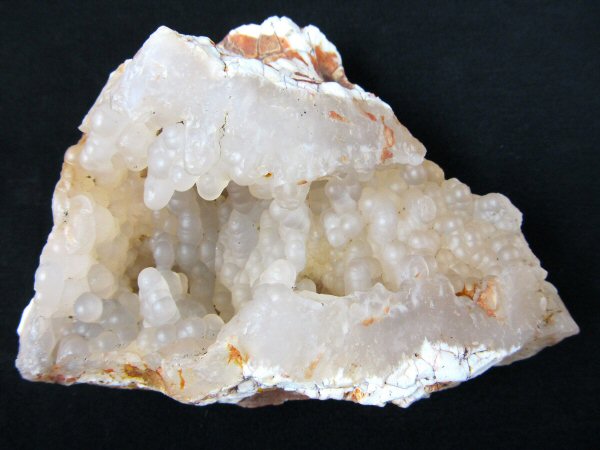
Another beautiful little botryoidal agate cavity with a pearly luster.
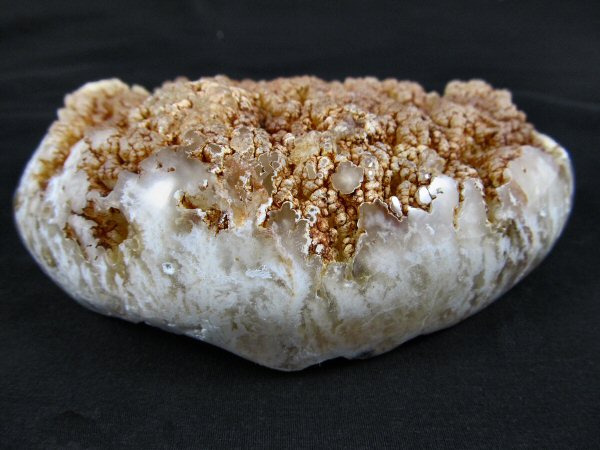
There seem to be any number of great, small sized pieces with sweet plume, just waiting to be picked up. This piece worked up very nicely.
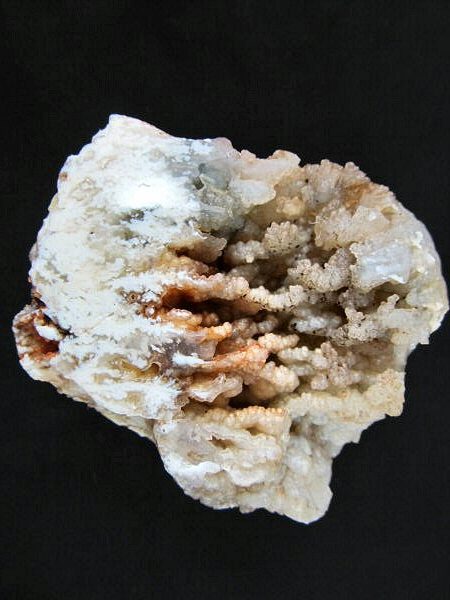
What follows is a short gallery of some of the polished pieces of beautiful white plume that I worked on when I got back from the field.
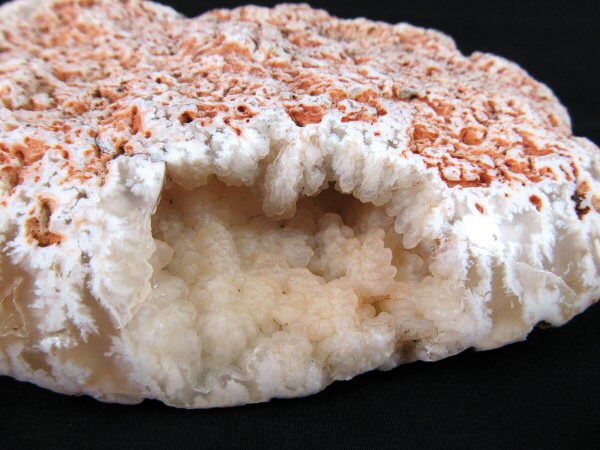
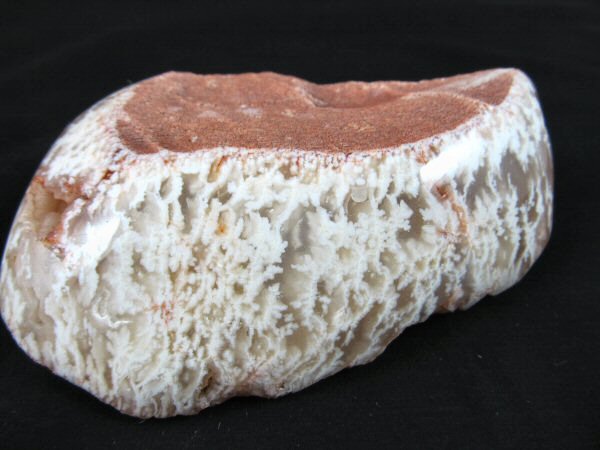
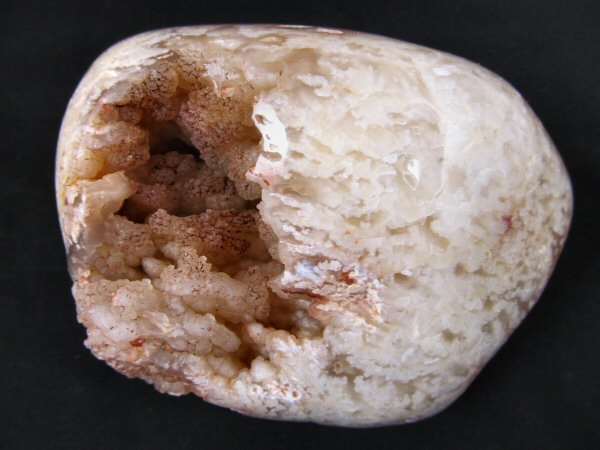
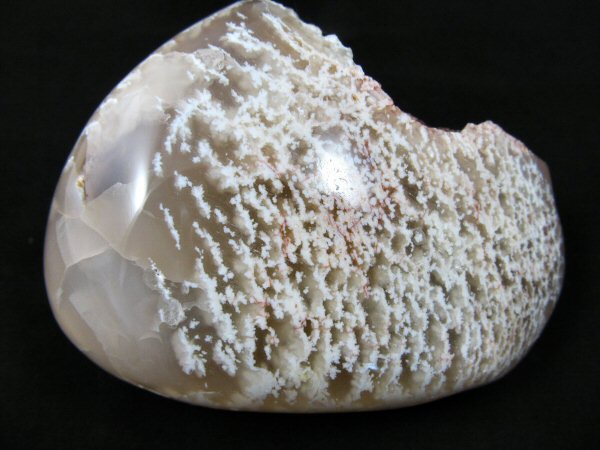
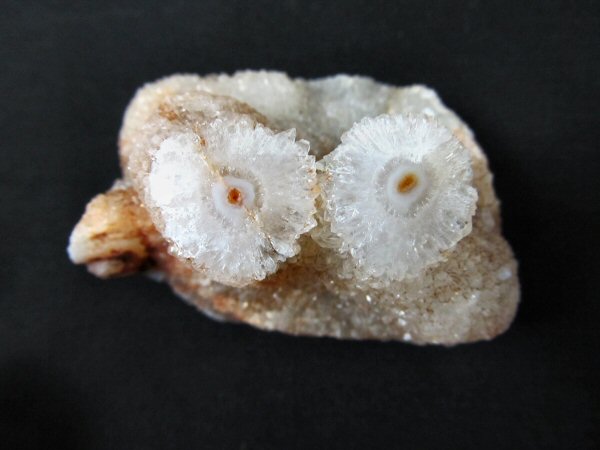
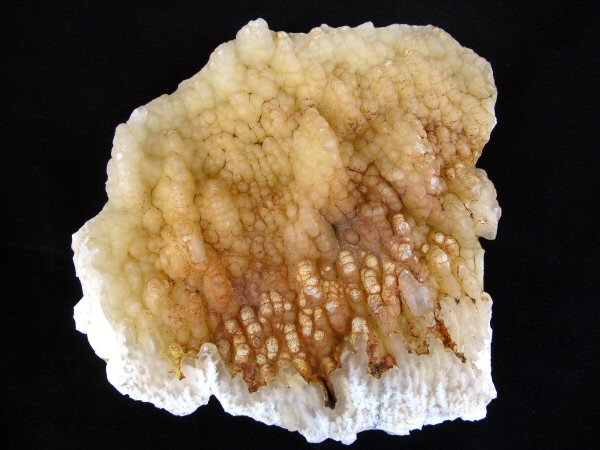
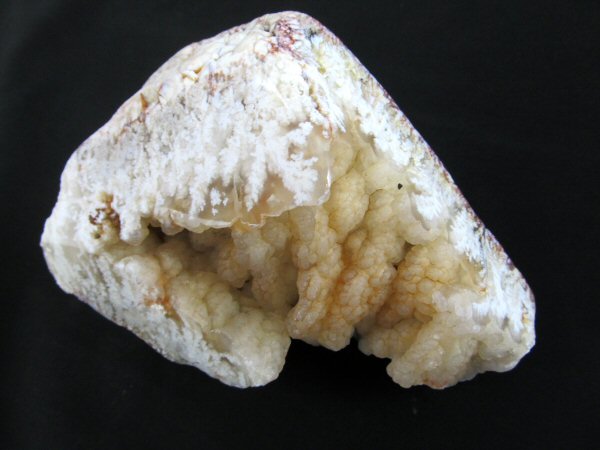
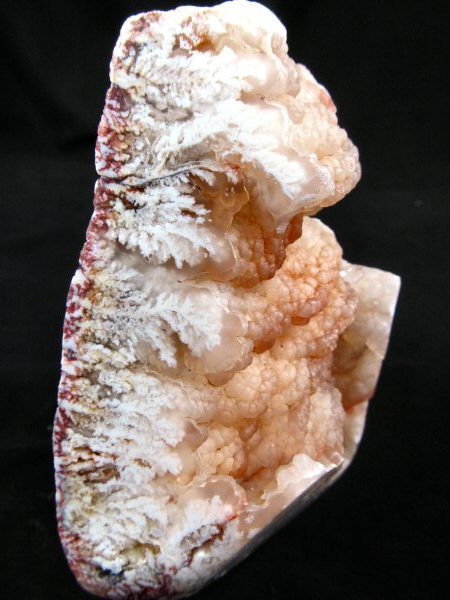
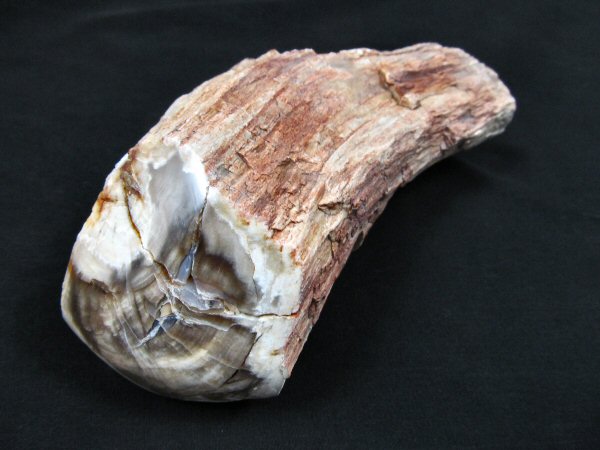
There was also a scant amount of petrified wood in the area. Not enough to call this a pet wood site, but a dilligent search will probably turn up a piece or two.
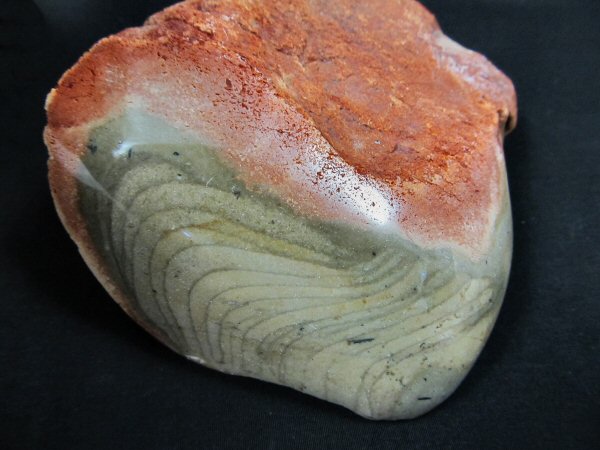
And hold on a moment! About one piece in several hundred chunks of that dull, brick red jasper that is lying around in some of the draws, actually cuts with some interesting pattern, and takes a mirror polish.
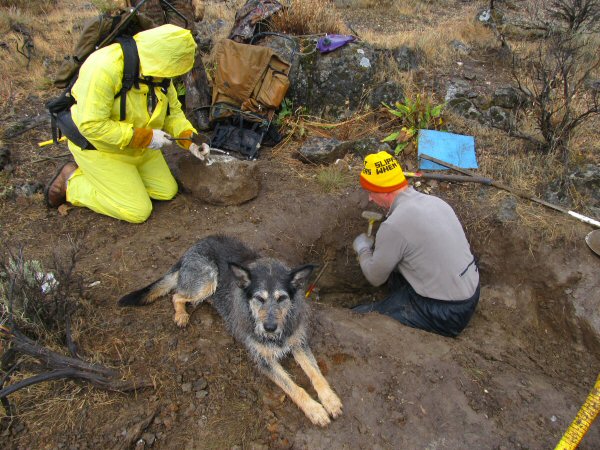
Back up at the pit I started, the two Kevins and Ken, who are all great diggers, are hard at work. The two Kevins have pulled out another major white plume boulder, that is close to 100 lbs. Ken is following the seam.
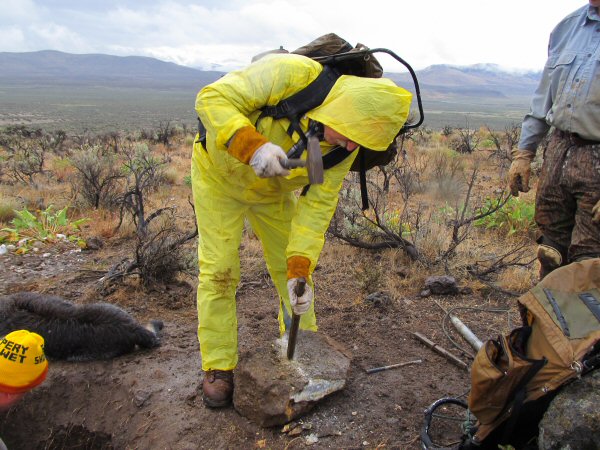
Kevin McDonald takes a turn at splitting the giant plume agate boulder, so the two Kevins can each have a 50 pound chunk to take home. Miraculously, the boulder does split almost perfectly, after a lot of work was put in to carve out a cleft in it.
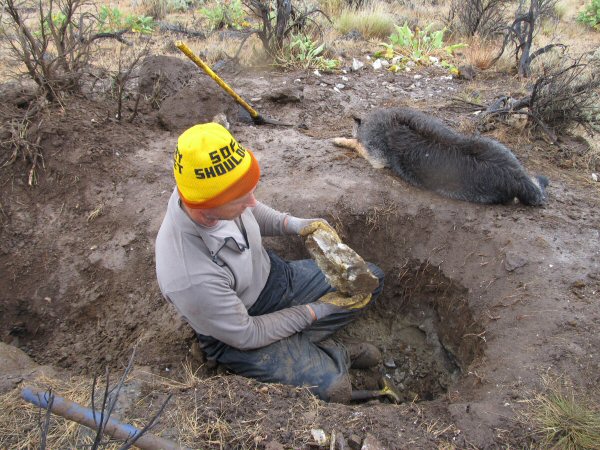
Ken continues to pull pretty good sized rocks out of the pit, that would make fine centerpieces for anybody’s collection.
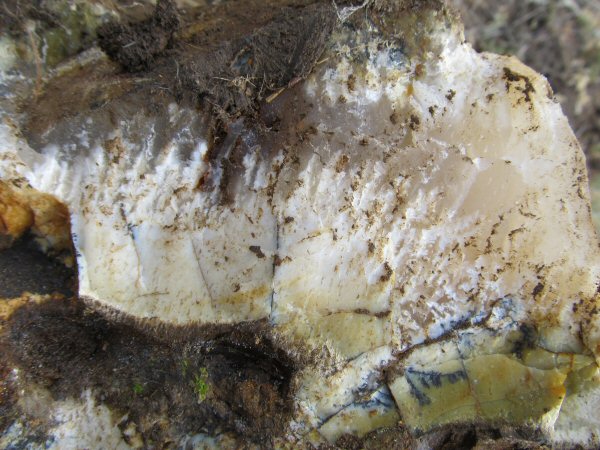
Almost everything that comes out shows great potential to cut beautiful white plume!
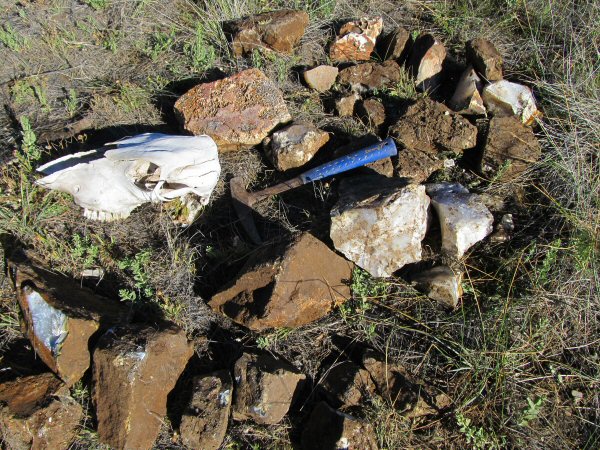
We get so many rocks that we make a “commons pile” for anybody in our group to pick from. Everybody gets a great collection of fine quality plume agate. Now that’s how a rockhound trip should be! Cow skull and rock pick for scale.
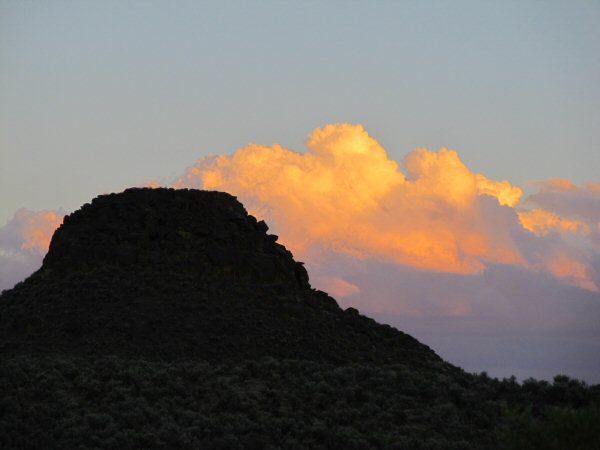
In my next blog installment, I’ll follow the further adventures of our rockhounding group, as the rains finally lift, and we head into the Owyhee region of far Eastern Oregon, for some pink plume agate, Owyhee jasper, and, unknown to us at the time, right into a major heat wave!
